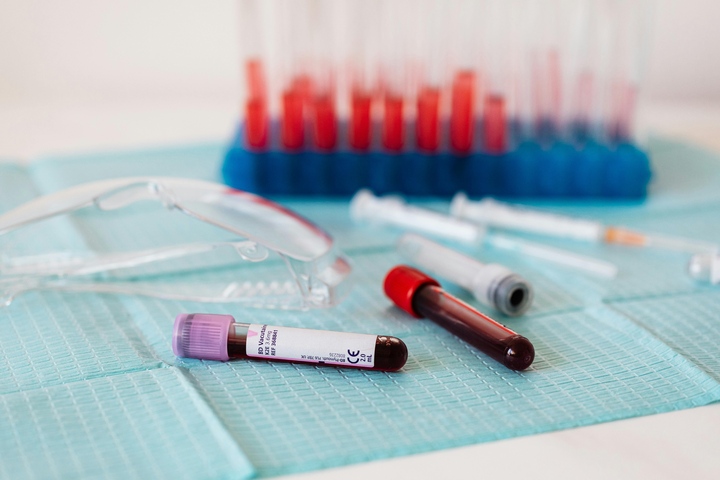MEDICAL WASTE RECYCLING
Swedish projects confirm viability of chemical recycling / Danish study looks at recycling of PET blood-collection tubes
By Elaine Burridge
Swedish researchers announced recently that they have successfully demonstrated the viability of chemical recycling for treating medical waste that would otherwise be incinerated or sent to landfill.
Swedish researchers announced recently that they have successfully demonstrated the viability of chemical recycling for treating medical waste that would otherwise be incinerated or sent to landfill.
 A Danish feasibility study has demonstrated that used PET blood-collection tubes can be cleaned, shredded, and moulded into new articles (Photo: Pexels/Karolina Kaboompics) |
Mechanical recycling is unable to treat disposable healthcare items because they are considered to be contaminated or biohazardous material; their high purity and quality requirements also render them unsuitable for this method.
Consequently, and in response to rising interest in recycling medical waste, Chalmers University of Technology (Gothenburg, Sweden; www.chalmers.se) undertook two separate projects to test thermochemical recycling.
The first project processed a few different product types, such as face masks and plastic gloves. In the second, a mixture containing about 10 different plastic materials, as well as cellulose, was created to represent the average composition of hospital waste generated by the region’s hospitals.
Researchers said the results of both projects have been “consistently positive”. “Thermochemical recycling not only addresses the problem that medical waste is not recycled today, but also facilitates the recovery of valuable carbon atoms,” said Judith González-Arias, leader of one of the projects. “This is fully in line with the principles of the circular economy and provides a sustainable solution to the urgent issue of medical waste management.”
Related: Gum-derived plastics for medical testing devices
However, she conceded that the volumes of waste from single-use medical items are not large enough for a functioning circular business model. “To build a plant of the size required for profitable thermochemical recycling, you would have to ensure a material flow of around 100,000 t/y before start-up,” she said, adding that new collaborations would be needed across the chain where healthcare waste could be part of the material flow.
Nevertheless, building such a plant in an existing chemical cluster, for instance at Stenungsund in Sweden, would optimise the process. The Chalmers researchers collaborated with major plastics producer Borealis (Vienna; www.borealisgroup.com) during their work. Borealis has been looking to add a chemical recycling plant to its site in Stenungsund, integrating the advanced technology into its cracker there.
Political factors pose another stumbling block, with laws and regulations varying across countries. Indeed, there have been calls for EU regulators to develop a policy framework to encourage investments in both chemical and mechanical recycling.
Related: Global market disruptions burden medical-device industry
Martin Seeman, associate professor of energy technology at Chalmers University, commented: “Certain political decisions would increase the value of plastic waste as a raw material for industry, and increase the chances of creating functioning circular business models around this type of recycling. For example, a requirement for carbon dioxide capture, when incinerating plastic, would create incentives to instead invest in more energy-efficient alternative technologies such as ours.”
The study entitled Steam gasification as a viable solution for converting single-use medical items into chemical building blocks with high yields for the plastic industry was published in peer-reviewed scientific journal ScienceDirect in February this year.
Recycling of PET blood tubes
Meanwhile, medical technology company Becton, Dickinson and Co. (BD, Franklin Lakes, New Jersey, USA; www.bd.com) and a consortium of Danish healthcare institutions have conducted a feasibility study to demonstrate that used PET blood-collection tubes can be cleaned, shredded, and moulded into new articles.
BD said the results showed that a transition to recycling would divert 33 t of high-quality plastic from being incinerated within the region every year. In southern Denmark, 7 mn tubes are used and incinerated each year, totalling about 21 t of PET, according to the company.
The next step, BD said, is to carry out more research to determine the best methods for cleaning and recycling that optimise the quality of the material and the climate impact, as well as to develop a viable recycling model.
The Danish institutions involved in the study were Odense University Hospital (Odense; https://en.ouh.dk), the Health Innovation Centre of Southern Denmark (Odense; www.syddansksundhedsinnovation.dk), the Danish Technological Institute (Taastrup; www.dti.dk), the Global Material & Asset Fund (Copenhagen; www.materials.fund), and Ecological Forum for Industry Transformation and Transaction (EcoFITT, Fredericia; www.cradletocradle.dk).
BD said the results showed that a transition to recycling would divert 33 t of high-quality plastic from being incinerated within the region every year. In southern Denmark, 7 mn tubes are used and incinerated each year, totalling about 21 t of PET, according to the company.
The next step, BD said, is to carry out more research to determine the best methods for cleaning and recycling that optimise the quality of the material and the climate impact, as well as to develop a viable recycling model.
The Danish institutions involved in the study were Odense University Hospital (Odense; https://en.ouh.dk), the Health Innovation Centre of Southern Denmark (Odense; www.syddansksundhedsinnovation.dk), the Danish Technological Institute (Taastrup; www.dti.dk), the Global Material & Asset Fund (Copenhagen; www.materials.fund), and Ecological Forum for Industry Transformation and Transaction (EcoFITT, Fredericia; www.cradletocradle.dk).
23.08.2024 Plasteurope.com [256009-0]
Published on 23.08.2024
